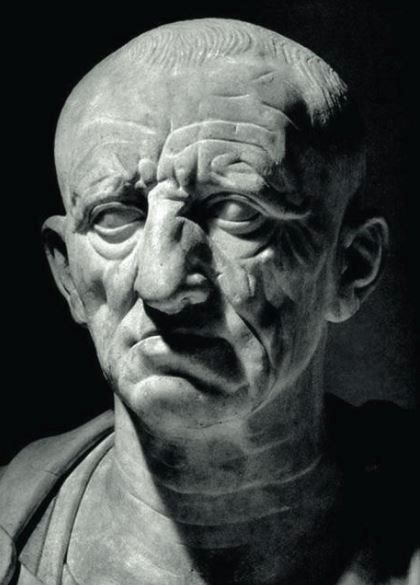„Človek, ktorý dokáže mlčať, aj keď má pravdu, je skoro Boh.“
Varianta: Silný je ten človek, ktorý dokáže mlčať aj vtedy, keď je v práve.
Marcus Porcius Cato bol rímsky politik, autor niekoľkých literárnych diel. Je nazývaný tiež Cato Cenzor podľa úradu cenzora, ktorý dlhé roky zastával, alebo Cato Starší , aby bol odlíšený od Catona Mladšieho, svojho pravnuka.
Pochádzal zo starobylej plebejskej rodiny z Tuscula, ktorá mala rodinnú tradíciu vojenskej služby, ale nie v štátnej správe. Bol vychovaný pre kariéru v armáde a v poľnohospodárstve, ale všimol si ho Lucius Valerius Flaccus, ktorý ho priviedol do Ríma. Postupne absolvoval celý rebríček štátnych hodností – tribunát , kvestúru , úrad edila , préturu , konzulát a nakoniec úrad cenzora .
Wikipedia

„Človek, ktorý dokáže mlčať, aj keď má pravdu, je skoro Boh.“
Varianta: Silný je ten človek, ktorý dokáže mlčať aj vtedy, keď je v práve.
„Neklesaj na duchu, ani v zlých pomeroch: maj nádej - len tá nás neopustí ani v smrti.“
Prisudzované výroky
Zdroj: [LENČOVÁ, Žofia.: Perly antiky. Ostrava: Knižní expres, 1997 ISBN 80-902272-7-9]
Prisudzované výroky
Zdroj: [LENČOVÁ, Žofia.: Perly antiky. Ostrava: Knižní expres, 1997 ISBN 80-902272-7-9]
Prisudzované výroky
Zdroj: [LENČOVÁ, Žofia.: Perly antiky. Ostrava: Knižní expres, 1997 ISBN 80-902272-7-9]
„Nikomu neuškodilo, že mlčal, skôr mu škodilo, že hovoril.“
Prisudzované výroky
Zdroj: [LENČOVÁ, Žofia.: Perly antiky. Ostrava: Knižní expres, 1997 ISBN 80-902272-7-9]
Prisudzované výroky
Zdroj: [LENČOVÁ, Žofia.: Perly antiky. Ostrava: Knižní expres, 1997 ISBN 80-902272-7-9]
“Wise men learn more from fools than fools from the wise.”
Plutarch's Life of Cato
Variant: Wise men profit more from fools than fools from wise men; for the wise men shun the mistakes of fools, but fools do not imitate the successes of the wise.
“All mankind rules its women, and we rule all mankind, but our women rule us.”
In bitter criticism of the prevalent domination of women (The Classical weekly, Vol. 25–26, 1932, p. 273).
Quoted in Plutarch Apophthegmata regum et imperatorum, in Greek.
This is composed of excerpts (with some paraphrasing) from a speech of Cato as reported in Livy's History of Rome, book 34, sections 2-4 http://mcadams.posc.mu.edu/txt/ah/Livy/Livy34.html.
Misattributed
“Grasp the subject, the words will follow.”
Rem tene, verba sequentur.
Cato's advice to orators (as quoted in Julius Victor, Art of Rhetoric. p. 197, Orell.; see also Wilhelm Sigismund Teuffel, Teuffel's History of Roman literature, Vol. 1 (1873), p. 158)
Cf. Dionysius Halicarnassensis, De Isocrate, ch. 12: "βούλεται δὲ ἡ φύσις τοῖς νοήμασιν ἕπεσθαι τὴν λέξιν, οὐ τῇ λέξει τὰ νοήματα." [Νature has it that style is in the service of thought, not the other way around.]
Variant translations:
Stick to your subject, and words will follow.
Get hold of the matter, the words will come of themselves.
Lay hold of the subject, and the words will follow.
Keep to the subject and the words will come.
Grasp the point, the words will follow.
Seize the subject; the words will follow.
Stick to the point; the words will follow.
Master the facts; the words will follow.
Lay hold of the substance, the words will follow.
Hold fast to the matter, the words will come.
Hang onto your meaning, and the words will come.
Have a grip of your theme and the words will come.
Hold the idea and the words will follow.
Stick to the meaning, and the words will take care of themselves.
“I would much rather have men ask why I have no statue, than why I have one.”
Attributed to Cato in Plutarch, Parallel Lives 19:4 http://www.perseus.tufts.edu/hopper/text?doc=Perseus%3Atext%3A2008.01.0013%3Achapter%3D19.
Original Greek: ‘μᾶλλον γὰρ,’ ἔφη, ‘βούλομαι ζητεῖσθαι, διὰ τί μου ἀνδριὰς οὐ κεῖται ἢ διὰ τί κεῖται’
Introduction: of the dignity of the farmer
De Agri Cultura, about 160 BC
Of buying a farm; Cited in John Claudius Loudon (1825) An Encyclopædia of Agriculture. Part 1. p. 14
Loudon commented: In the time of Cato the Censor, the author of The Husbandry of the Ancients observed, though the operations of agriculture were generally performed by servants, yet the great men among the Roman continued to give particular attention to it, studied its improvement, and were very careful and exact in the management of nil their country affairs. This appears from the directions given them by this most attentive farmer. Those great men had both houses in town, and villas in the country; and, as they resided frequently in town, the management of their country affairs was committed to a bailiff or overseer. Now their attention to the culture of their land and to every other branch of husbandry, appears, from the directions given them how to behave upon their arrival from the city at their villas.
De Agri Cultura, about 160 BC
“Hairy in front, opportunity is bald behind.”
Fronte capillata, post est occasio calva.
Disticha, Bk. ii, No. 26. The Distichs of Cato were long attributed to Cato the Elder but probably are the work of a much later author called Dionysius Cato from the 3rd or 4th century A.D.
Misattributed
“Sometimes quoted as Carthago delenda est.”
Ceterum censeo Carthaginem esse delendam.
Moreover, I consider that Carthage should be destroyed.
Cato was convinced that the security of Rome depended on the annihilation of Carthage and he urged his countrymen to the Third Punic War. Towards the end of his life he ended all of his speeches in the Roman senate with these words.
“Buy not what you want, but what you have need of; what you do not want is dear at a farthing.”
Emas non quod opus est, sed quod necesse est. Quod non opus est, asse carum est.
As quoted by Seneca (Epistles, 94)